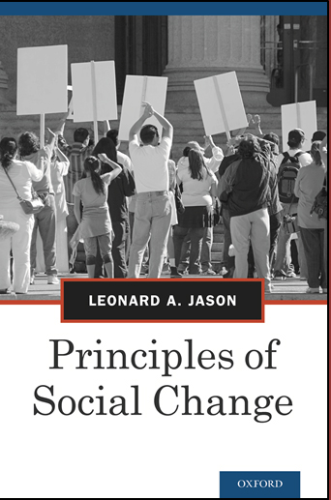Jan 31, 2013
DePaul professor’s book details how to better achieve social change
DePaul professor’s book details how to better achieve social change
Despite efforts of many well-intentioned organizations and individuals working for change, social movements often fail. “Principles of Social Change” by Leonard Jason, a DePaul University professor of psychology and director of its Center for Community Research, examines how change can be accomplished more effectively. The new book, published by Oxford University Press, is intended for academics as well as anyone working to bring about societal improvement.
“Principles of Social Change” is drawn from Jason’s 30-plus years of experience as a researcher working in the field with medical professionals, community organizations, governments and others to improve society through initiatives such as reducing teen smoking and stemming recidivism among former alcoholics and substance abusers.
“The efforts of social activists and mental health professionals to institute population-level social change, such as reducing poverty, often fail because they tend to focus on individuals and not real-life community conditions,” said Jason.
“They also fail to account for stakeholder commitment to the status quo and do not develop concrete strategies to build coalitions to alter policies. These unsuccessful attempts at change can leave citizens, community groups and healthcare professionals feeling dispirited and overwhelmed,” he said.
Jason points to the current epidemic of gun violence as a long intractable social problem that has repeatedly defied massive reduction efforts, but could be addressed through the principles he details. He notes that similar steps have been used to dramatically reduce the prevalence of smoking in many developed countries.
The book outlines how those looking to bring about social change need to better understand what is required for success and to avoid typical pitfalls, including:
- Clearly defining the change being sought.
- Identifying current stakeholders and forces leading to status quo.
- Creating coalitions that will work for the desired change.
- Being patient while persistently working toward the goal.
- Measuring success and integrating incremental progress into revised plans.
“Paradigm shifts rarely happen within established institutions in a society. It often takes a grassroots initiative that radically challenges the system or status quo,” said Jason.
“Throughout history, it has been ordinary people, driven by a desire for social justice, who have achieved meaningful, life-changing reforms, often starting in their own communities,” he said. “Ordinary individuals who do not lose faith can overcome enormous odds to target the root of a systemic problem.”
Jason is an author or editor of more than 20 books, including “Havens: True stories of community healing,” “Rescued Lives: The Oxford House approach to substance abuse,” and “Remote control: A sensible approach to kids, TV, and the new electronic media.”
His current research involves evaluating a bilingual voluntary community-based healthcare organization, which is funded by the National Institute on Alcohol Abuse and Alcoholism. He also is studying community participatory intervention with high-risk African-American women under a grant from the National Center on Minority Health and Health Disparities.
Jason is a past recipient of the American Psychological Association's Karl F. Heiser Award for Advocacy.
About DePaul
With approximately 25,000 students, DePaul is the largest Catholic university in the United States and the largest private, nonprofit university in the Midwest. The university offers approximately 275 graduate and undergraduate programs of study on three Chicago and two suburban campuses. Founded in 1898, DePaul remains committed to providing a quality education through personal attention to students from a wide range of backgrounds. For more information, visit www.depaul.edu.
EDITOR’S NOTE: Reporters wishing to interview Jason can reach him at 312-325-2018 or at ljason@depaul.edu.

Principles of Social Change By Leonard Jason
